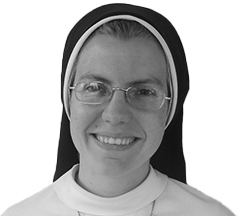One of my students shared with his classmates on Martin Luther King Jr. Day that the last words from King’s “I Have a Dream” speech — “Free at last!” — are written on his tombstone. What a moving epitaph, capturing not only King’s struggle for equality, but also the hope of our shared Christian faith.
Indeed, it is only once we are with the Lord face to face that we will be truly “free at last.” True and lasting freedom comes through an abiding relationship with Jesus Christ, made perfect and complete in heavenly glory.
How often we seek freedom in the things of the earth, instead of in Christ! Every advertisement that flashes across our televisions or computer screens promises to make us free by giving us whatever we think we need or want. But the more we seek after these things, the more we find ourselves empty and in need.
How often we seek freedom in the things of the earth, instead of in Christ! Every advertisement that flashes across our televisions or computer screens promises to make us free by giving us whatever we think we need or want. But the more we seek after these things, the more we find ourselves empty and in need.
Or perhaps we seek freedom in earthly honor and glory. If only we can get that scholarship, or win that competition, or get into the school of our choice, or be the head of the company, then, we think, we will be free to be ourselves. But does this mean that we cannot be ourselves all through the process of competing or climbing the corporate ladder? And what happens when we reach the top and find ourselves still seeking?
In Elizabeth George Speare’s historical novel The Bronze Bow (spoiler alert), the main character, a Jew named Daniel living during the time of Christ, seeks revenge against the Romans, who have caused his family much suffering. He wants to join a group of zealots and fight for the Kingdom. But he is bound to care for a sick sister. Since she is his only living relative, and he has lost touch with all of his friends, he realizes that he will be completely free if she dies. But, faced now with the prospect of this version of freedom for which he has longed, he understands that what really awaits him there is a deep loneliness. In this recognition of emptiness, he finally finds himself able to embrace Jesus and the messages he has heard from Him throughout the book. Only then does he find true freedom: freedom from revenge and hatred.
As Daniel learned, the path to true freedom is not isolation or self-promotion, but rather a deep and intimate communion with Jesus Christ. To be guided by the truth, to live according to the way things are in reality — not of our own making or thinking — is to be free. And Jesus Christ Himself is “the way, the truth, and the life.” There is no greater Reality than He. Living in relationship with Him — out of a knowledge of being loved and in a desire to love in return — is the greatest freedom.
When that relationship is complete and unbreakable — when we see Him face to face for eternity — then we shall truly recognize that we are “free at last.” Let us spend every moment of our lives seeking that everlasting freedom, which is grounded in the truth.
Sr. Mary Martha Becnel is a member of the Ann Arbor-based Dominican Sisters of Mary, Mother of the Eucharist.










